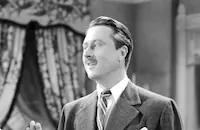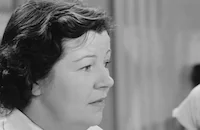I Love Melvin

Brief Synopsis
Cast & Crew
Don Weis
Donald O'connor
Debbie Reynolds
Una Merkel
Richard Anderson
Allyn Joslyn
Film Details
Technical Specs

Synopsis
On her way to a dance rehearsal, chorus girl Judy LeRoy strolls through Central Park and dreams of meeting her true love. Melvin Hoover is having the same thoughts when he and Judy collide and exchange harsh words before going their separate ways. Melvin then heads to the lion house at the zoo and goes to work as the assistant to curmudgeonly Look magazine photographer Mergo. Later, while walking by the theater during a matinee of Judy's show, Quarterback Kelly , Melvin spots her face on a poster and uses his magazine credentials to go backstage during her dance number. After the show, as Judy is leaving with her beau, pompous paper box heir Harry Flack, Melvin approaches her and says he would like to do a photo spread on her for Look . Judy agrees, and in the ensuing weeks of photo sessions, Melvin and Judy begin to fall in love. As Judy spends more and more time with Melvin, her father, Frank "Pop" Schneider, complains that she is neglecting Harry. One night, Judy tells Melvin that her family is pressuring her to marry Harry, whom she does not love, and asks him to put her on the cover of Look . Desperate to win Judy for himself, Melvin agrees to try. The next day, Melvin begins papering the magazine's offices with photographs of Judy, but the editors decide to put a race horse on the cover. Meanwhile, the cast of Quarterback Kelly is notified that the show will close in three weeks. When Melvin drops by the theater, Judy tells him that Harry is coming to dinner on Monday to speak with her father, adding that he proposed to her the previous night but she gave no answer. Back at the office, Melvin enlists Mergo's help in producing a fake issue of the magazine with Judy's picture on the cover. On Monday night, as Harry is about to ask Pop for Judy's hand, Melvin comes by to show Judy the fake issue, and she excitedly assumes it is the actual cover. Before Melvin can tell her the truth, Judy tells Harry she cannot marry him. On the day the new issue of Look is to come out, Pop marches into the pharmacy where he works and gives his much-despised boss a piece of his mind. When the magazines are delivered, however, there is a picture of a boxing champion on the cover. Melvin goes to the Schneider house and tells Judy and her mother the cover was a mistake. Harry, having seen the magazine cover, drops by with flowers just before Pop staggers in and announces that he has been fired. Melvin nervously claims that Judy's picture will be on the next issue, and Judy says that if it is not, she will have to take a job with the road company of Quarterback Kelly . Cover after cover comes out without Judy's picture, and one night, while performing in Philadelphia, Judy gets knocked out during a strenuous dance number. When Judy learns that Pop is going to call on Look editor Henneman to ask when Judy's cover will come out, she rushes back to New York and interrupts the meeting to plead for Melvin. Henneman tells them the cover they saw was a fake, and Judy realizes that Melvin did it to keep her from marrying Harry. When Mergo informs them that his assistant quit three weeks ago, Judy's tearful declaration of love for Melvin wins Henneman over, and the police begin searching for him. Later, while sleeping on a bench outside the zoo in Central Park, Melvin sees a man reading an issue of Look with Judy on the cover. A zoo guard spots Melvin, and the police and Judy chase him through the park until he and Judy finally collide on the spot where they first bumped into each other. Judy shows him the magazine, which contains a full-page ad beseeching Melvin to come back, and the sweethearts kiss.

Director
Don Weis
Cast

Donald O'connor

Debbie Reynolds

Una Merkel

Richard Anderson

Allyn Joslyn

Les Tremayne
Noreen Corcoran

Jim Backus
Barbara Ruick

Robert Taylor
William B. Lee
Frank Hyers

Charles Halton
Tommy Walker
Tom Quinn
Forbes Murray
Lillian Culver
Ted Eckelberry
Norma Jean Salina
Nikki Juston
Robert Spencer
Pat O'malley
W. Anthony Merrill
Bill Lewin
Patrick Conway
Robert Smiley
Jewel Rose
Marjorie Wood
Marcus Sax
Paul Larson
John O'connor
Ned Glass
Helen Winston
Robert Knapp
Joan Miller
Phil Garris
June Whitley
Tristram Coffin
Wilson Wood
Harry Lauter
Jackson Halliday
Ann Mccrea
Joann Arnold
Diann James
Mitchell Lewis
Edward Clark

Margaret Bert
Wallace Earle
Allan Ray
Robert Foulk
Robert B. Williams
Bill Reid
Roy Engel
Perry Sheehan
Alma Maison
Lynn Wilde
Thomas Dillon
Paul Larson
Clarence Elmer
Richard Collier
Lester Lonergan
Nesdon Booth

Steve Forrest
Bob Fuller
Walton Walker
Jack Colton
Jack Mattis
Robert Irvine
Roy Damron
Ray Weamer
Donna Jenson
Peggy Burke
Pamela Drake
Lucille La Marr
Melba Snowden
James Gonzales
Crew
Robert Alton
Peter Ballbusch
Alvord Eiseman
Adrienne Fazan
Ruth Brooks Flippen
Cedric Gibbons
A. Arnold Gillespie
Mack Gordon
Sydney Guilaroff
Eddie Imazu
Henri Jaffa
Marlene Knoll
Jacque Mapes
Skip Martin
Josef Myrow
Helen Rose
Harold Rosson
Douglas Shearer
Jack Martin Smith
Georgie Stoll
Marvin Stuart
William Tuttle
Laslo Vadnay
George Wells
George Wells
Edwin B. Willis

Photo Collections
Videos
Movie Clip


Trailer
Film Details
Technical Specs

Articles
I Love Melvin
Into this picture comes goofy Look magazine photo assistant Melvin Hoover (Donald O'Connor) with a cranky photographer boss named Mergo (Jim Backus). Melvin is instantly smitten after seeing Judy on stage and, posing as a Look photographer, suggests a photo shoot with her that could potentially be featured in the magazine. Soon that photo shoot becomes many photo shoots and the couple are seeing movies and having dinner together. But Melvin's ploy to win Judy's heart hits a bump in the road when he fakes--with help from Mergo--a Look magazine issue with Judy on the cover and her whole family assumes it's real.
A lively boy meets girl musical, I Love Melvin's high energy and sense of fun are embodied by Donald O'Connor's irrepressible pep. With a family background first in the circus and then in vaudeville, O'Connor made his onscreen debut with his brother Billy in the Warners musical Melody for Two (1937). He was offered a Paramount contract after his appearance in the Bing Crosby musical Sing You Sinners (1938). After growing out of child roles, O'Connor went back to vaudeville for a time. But he eventually returned to Hollywood as a teen performer in Universal studio's "teen swing brigade." In 1943 O'Connor was voted Hollywood's most versatile teenage performer. O'Connor's greatest success, however, came with his appearance in a series of films beginning with Francis in 1950, about a talking mule; the Francis films along with the Ma and Pa Kettle series that began in 1949, kept Universal afloat in the lean years. O'Connor was given a succession of Technicolor musicals to appease the star while he labored on the Francis series. O'Connor's most memorable supporting appearance in a musical was, of course, in Singin' in the Rain (1952) alongside Debbie Reynolds.
I Love Melvin was an attempt to recreate the magic of MGM's winning Singin' in the Rain team of Debbie Reynolds and Donald O'Connor who had to be borrowed by MGM from Universal. The pair worked on location in New York City for I Love Melvin.
Born in Texas, and brought to Hollywood's attention in 1948 when she won the Miss Burbank beauty contest, Debbie Reynolds became synonymous with girl next door buoyancy and sweetness in the many film roles she tackled. Like other classic film couples including Douglas Fairbanks and Mary Pickford, Clark Gable and Carole Lombard, Reynolds' marriage to singer Eddie Fisher became another definitive show biz union. But despite being heralded as the "perfect" couple upon their marriage in 1955, their bond ended four years later in a shambles when Fisher left Reynolds for Elizabeth Taylor. Reynolds' popularity only rocketed following news of the affair, as the public saw her in the more sympathetic role of the scorned wife.
Unfortunately, Reynolds continued to be unlucky in love. She later married wealthy shoe manufacturer Harry Karl who, unfortunately, had a gambling problem and frittered away both his and Reynolds' money and homes. Reynolds said that it was Karl's gambling problem and the $10 million debt he left her and her daughter Carrie Fisher that destroyed her more than Elizabeth Taylor's betrayal.
Though Reynolds' film career eventually stalled in the early 1970s, she found a second life in television and on the New York stage where she made her Broadway debut in the 1973 revival of the musical Irene and received rave reviews and a Tony nomination.
The New York Times critic Bosley Crowther praised Reynolds in I Love Melvin, writing, "Even a little of Miss Reynolds is pleasing and refreshing to see, she being a pretty little package of simple girlish talents and graceful form." That being said, Crowther also wished in the same review for "a more substantial script."
Director: Don Weis
Producer: George Wells
Screenplay: George Wells from a story by Laszlo Vadnay
Cinematography: Harold Rosson
Production Design: Cedric Gibbons, Eddie Imazu, Jack Martin Smith
Music: Skip Martin
Cast: Judy LeRoy (Debbie Reynolds), Melvin Hoover (Donald O'Connor), Mergo (Jim Backus), Mom Schneider (Una Merkel), Harry Flack (Richard Anderson), Pop Schneider (Allyn Joslyn), Mr. Henneman (Les Tremayne), Clarabelle (Noreen Corcoran), Studio Guide (Barbara Ruick).
C-77m. Closed Captioning.
by Felicia Feaster

I Love Melvin
Quotes
Judy! Come on, get up! It's late! JUDY!- Mrs. Schneider
Aw, Mom, Bob Taylor was just saying something important!- Judy
Oh, come on!- Mrs. Schneider
Oh, just five minutes! Maybe I can dream him back!- Judy
Would you like to have dinner with us?- Judy
Pop says if the subject comes up, no.- Clarabelle
You know, that fella's got maybe a thousand pictures of you. What's he doing with 'em, papering a wall?- Mr. Schneider
What is it, a timed exposure?- Mr. Schneider
Melvin Hoover, "Look"- Melvin
At what?- Mr. Schneider
Trivia
Notes
According to billing information contained in the file on the film in the MPAA/PCA Collection at the AMPAS Library, Howard Keel was originally signed as the guest star, but was replaced by Robert Taylor. A May 23, 1952 news item in Hollywood Reporter reported that Vera-Ellen would also appear in a guest spot, but she was not in the released film. During the first month of production, Hollywood Reporter production charts listed child actress Donna Corcoran in the cast instead of her sister, Noreen Corcoran, who played "Clarabelle." A May 27, 1952 Hollywood Reporter news item includes Sue Casey, Marietta Elliot, Margaret Hogan, Gretchen Houser, Jetsey Parker, Pat Dean Smith, George Ellsworth, James Elsegood and Ward Ellis in the cast, but their appearance in the final film has not been confirmed. Character actor Richard Collins made his motion picture debut in the film.
Portions of the film were shot on location in New York, at various sites within Central Park, the Empire State Building and the Brooklyn Bridge. The film features two musical dream sequences in which "Judy LeRoy" envisions herself as a famous movie star. In the first dream, Judy performs in a lavish production number and shares a romantic moment with Robert Taylor. In the second dream, Judy dances with six men whose costumes and masks make them resemble M-G-M stars Fred Astaire and Gene Kelly. In the production number from the film's fictional Broadway show, Quarterback Kelly, Judy plays a football and is tossed around by the team members during a game.

Miscellaneous Notes
Released in United States Spring March 20, 1953
Released in United States Spring March 20, 1953














